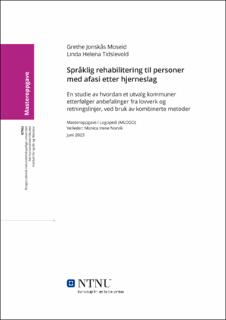| dc.contributor.advisor | Norvik, Monica Irene | |
| dc.contributor.author | Moseid, Grethe Jonskås | |
| dc.contributor.author | Tidslevold, Linda Helena | |
| dc.date.accessioned | 2023-10-20T17:19:36Z | |
| dc.date.available | 2023-10-20T17:19:36Z | |
| dc.date.issued | 2023 | |
| dc.identifier | no.ntnu:inspera:146718924:46987460 | |
| dc.identifier.uri | https://hdl.handle.net/11250/3097857 | |
| dc.description.abstract | Formål: Formålet med oppgaven var å få en innsikt i hva offentlige dokumenter anbefaler av språklig rehabilitering til personer med afasi etter hjerneslag, og hvordan rehabiliteringen er organisert i kommunene i dag.
Problemstilling: «Hvordan organiseres den språklige rehabiliteringen til personer med afasi etter hjerneslag i norske kommuner?»
For å besvare problemstillingen har vi benyttet fem forskningsspørsmål:
• Hva anbefales i offentlige dokumenter vedrørende språklig rehabilitering til personer med afasi etter hjerneslag?
• Får personer med afasi etter hjerneslag tilbud om en helhetlig og tverrfaglig rehabilitering i norske kommuner, som inkluderer språklig
rehabilitering?
• Overholder norske kommuner anbefalt mengde og intensitet i den språklige rehabiliteringen til personer med afasi etter hjerneslag?
• Hvorfor er språklig rehabilitering viktig med tanke på brukermedvirkning, ytringsfrihet, og god livskvalitet?
• Hvordan er tilgangen til logopeder i norske kommuner?
Metode: Vi har benyttet kombinerte metoder; I kvalitativ del har vi gjennomført en dokumentanalyse. I den kvantitative delen har vi gjennomført en spørreundersøkelse som ble sendt til et tilfeldig utvalg norske kommuner.
Resultater: Funnene viste at de som jobber med tildeling av logopedressurser, synes det er uklart hvem som har ansvaret for at pasienter med afasi får språklig rehabilitering. Det er lite tverrfaglig samarbeid mellom opplærings- og helsesektoren når det gjelder språklige rehabiliteringen til personer med afasi etter hjerneslag. Undersøkelsen viste at mange personer med afasi etter hjerneslag ikke får den anbefalte mengden og intensiteten i den språklige rehabiliteringen. Videre kom det frem at logopedressursen er minst i de små og mellomstore kommunene. Alle de store kommunene hadde ansatt egen logoped. Likevel oppgav over halvparten av respondentene at personer med afasi ikke får anbefalt mengde og intensitet av språklig rehabilitering på grunn av mangel på logopedtilgang. Personer med afasi står i fare for å ikke få mulighet til brukermedvirkning, når språklig rehabilitering ikke dekkes.
Konklusjon: Organiseringen av det kommunale tilbudet om språklig rehabilitering til personer med afasi som følge av hjerneslag er forskjellig fra kommune til kommune. Det er tilfeldigheter som hvilke lovverk som ligger til grunn for rehabiliteringen, hvor man bor, og ressurser i norske kommuner som er med på å avgjøre hvor mye og hvor intensiv språklig rehabilitering personer med afasi mottar. Funn fra oppgaven tyder på at personer med afasi etter hjerneslag ikke får den språklige rehabiliteringen som er anbefalt, noe som med stor sannsynlighet vil kunne bedres om logoped ble en skal-tjeneste i kommunen. Det vil også kunne bidra til å sikre et jevnere fordelt tilbud uansett hvor man bor. | |
| dc.description.abstract | Purpose: The purpose of the thesis was to gain an insight into what public documents recommend for language rehabilitation for people with aphasia following stroke, and how rehabilitation is organized in the municipalities in Norway today.
Problem statement: “How is the language rehabilitation for people with aphasia following stroke organized in Norwegian municipalities?”
To answer the question, we have used five research questions:
• What do public documents recommend as language rehabilitation for people with aphasia following stroke?
• Do the Norwegian municipalities offer people with aphasia following stroke holistic and interdisciplinary rehabilitation, which includes
language rehabilitation?
• Does the municipality comply with the recommended quantity and intensity of language rehabilitation for people with aphasia following
stroke?
• Why is language rehabilitation important in term of user participation, freedom of expression and a good quality of life?
• How is the access to speech therapists in Norwegian municipalities?
Method: The thesis was based on using mixed methods: In the qualitative part, we have carried out a document analysis. In the quantitative part, we have carried out a survey which was sent to a random selection of Norwegian municipalities.
Results: The findings showed that those who work with the allocation of speech therapy resources think it is unclear who is responsible for ensuring that people with aphasia receive language rehabilitation. There is little interdisciplinary cooperation between the education and health sectors in language rehabilitation of people with aphasia following stroke. The survey showed that many people with aphasia do not receive the recommended amount and intensity of language rehabilitation, and it was also found that speech therapist resources are least in the small and medium-sized municipalities. All the large municipalities had employed their own speech therapists. Nevertheless, more than half of the respondents stated that people with aphasia do not receive the recommended amount and intensity of language rehabilitation, due to a lack of access to speech therapists.
Conclusion: The organization of the municipal offer of language rehabilitation for people with aphasia following stroke, differ from municipality to municipality. Coincidences such as; which legislation is the basis for the rehabilitation, where you live, and the municipalities’ resources, in part determine what kind of language rehabilitation people with aphasia receive. Findings from the thesis indicate that people with aphasia following stroke do not receive the language rehabilitation that is recommended. This could very likely be improved if speech therapists became a compulsory service in the municipalities. It would also help to ensure a more evenly distrubuted offer, regardless of where you live. | |
| dc.language | nob | |
| dc.publisher | NTNU | |
| dc.title | Språklig rehabilitering til personer med afasi etter hjerneslag | |
| dc.type | Master thesis | |
